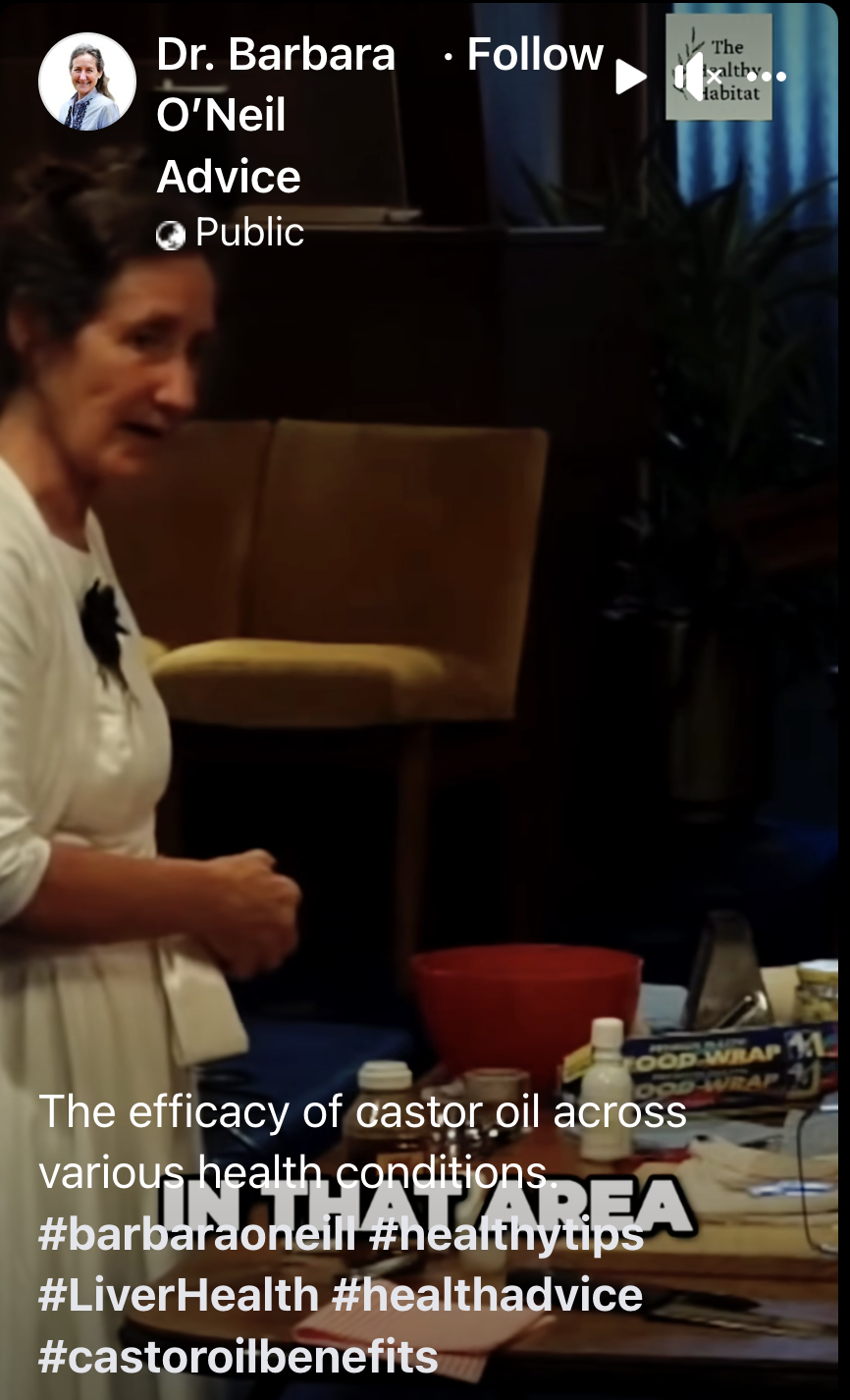CORRECTION -- STORY UPDATED: check for updates below.

When applied to the "liver area," does castor oil "break up" gallstones and kidney stones, as a video on Facebook claimed? No, that's not true: No substantive evidence exists that topically applied castor oil can treat gallstones or kidney stones. Castor oil is "generally recognized as safe and effective as an over-the-counter laxative product," the Food and Drug Administration confirmed to Lead Stories. However, Lead Stories found no indication that applying caster oil topically to the liver area is an approved, effective treatment for gallstones or kidney stones.
The claim appeared in a nearly two-hour video shared on YouTube on February 27, 2016 (archive), that identified the featured speaker as a controversial naturopath from Australia named Barbara O'Neill, who said that "when applied to the liver area under the right rib," castor oil can "break up" gallstones and kidney stones. At the 1:02:33 mark of the video shared to YouTube, which was posted by Royal Oak Seventh-day Adventist Church (archive) in New Zealand, O'Neill said the following:
So, you can use it to break up gallstones. So you would put it, say, on the liver area under the right rib; you may put it at the back to break up kidney stones.
This video was clipped and shared on Facebook on March 15, 2024, seven years later (archive), with a caption that read, "The efficacy of castor oil across various health conditions. #barbaraoneill #healthytips #LiverHealth #healthadvice #castrooilbenefits."
Here is how the post appeared at the time of writing:
(Source: Facebook screenshot taken Mon March 18 11:58:00 UTC 2024)
In the same video shared to YouTube, O'Neill also falsely stated that castor oil compresses applied to the abdomen "heal" the colon to treat diarrhea and constipation -- a claim that Lead Stories debunked in April 2023.
"In general, consumers should be cautious of food (or other) products that don't go through the FDA's pre-market approval that are marketed and sold claiming to prevent, treat, or cure diseases or other health conditions," the Food and Drug Administration (FDA) wrote to Lead Stories (archive) in an email received on March 20, 2024. "Products that are not proven safe and effective for those purposes not only defraud consumers of money, they can lead to delays in getting proper diagnosis and treatment of a potentially serious condition. They can also place people at risk for serious injury."
However, castor oil is "generally recognized as safe and effective as an over-the-counter laxative product," the FDA wrote.
Lead Stories found no substantive evidence that castor oil can treat, break down or remove gallstones and kidney stones when ingested or applied as a compress.
Castor oil is a vegetable oil made from Ricinus communis, a plant common in the Eastern areas of the world, according to records held at the National Library of Medicine (archive). Though there is anecdotal evidence (archive) of the supposed benefits (archive) of topically applied castor oil, such uses have not been confirmed by medical experts. According to a 2005 research article published in the journal Evidence-Based Integrative Medicine (archive), "castor oil is either not well absorbed through the skin" or is metabolized differently than ingested castor oil.
Castor oil is classified (archive) by the FDA as a "laxative drug product in a form suitable for oral or rectal administration [that] is generally recognized as safe and effective and is not misbranded if it meets each condition in this [over the counter] monograph" (archive) when taken orally (archive) for a limited time and at the discretion of a physician. When improperly used, ingested castor oil can cause serious conditions such as gastroenteritis and gastrointestinal hemorrhage (archive), according to Meyler's Side Effects of Drugs (archive). (Of note, castor oil is also approved by the FDA as a food additive, archived here.)
Claims that topically applied castor oil can "break up" kidney stones or gallstones were made in 2016 by O'Neill, who was barred from practicing by Australian health officials three years later. As Lead Stories has previously reported, O'Neill was permanently prohibited by the New South Wales Health Care Complaints Commission (HCCC) in 2019 from practicing any form of health care after an investigation concluded that her spread of misinformation breached the Code of Conduct for Unregistered Practitioners.
In a news release published on September 24, 2019, HCCC stated that O'Neill made "dubious and dangerous health claims" that were "not evidence based or supported by mainstream medicine." HCCC added that O'Neill could not stay within the limits of her training, failed to provide health services safely and ethically, and misled vulnerable people by discouraging them from seeking medical treatments appropriate to their conditions. Ultimately, these conclusions resulted in O'Neill being permanently prohibited in New South Wales from practicing health care in any capacity.
Gallstones are "hardened deposits of digestive fluid" produced in the liver, the Mayo Clinic writes (archive). They range from "as small as a grain of sand to as large as a golf ball." Mount Sinai notes (archive) that a castor oil pack with heat can help reduce swelling but not "break up" gallstones, as suggested by O'Neill. More importantly, people who experience symptoms of gallstones often require gallbladder removal surgery.
Kidney stones are hard deposits of minerals and salts formed inside the kidneys that the Mayo Clinic writes (archive) are caused by diet, excess body weight and some medical conditions. Unlike gallstones, kidney stones can typically be passed, albeit quite painfully.
Other claims made by O'Neill that Lead Stories has debunked can be read here.
Updates:
-
2024-03-21T17:49:46Z 2024-03-21T17:49:46Z This debunk has been updated to correct a misstatement about the place in which O'Neill was sanctioned. Her privileges were revoked in New South Wales, Australia.


















